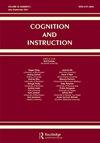Undergraduate Engineering Students’ Types and Quality of Knowledge Used in Synthetic Modeling
IF 2.3
1区 心理学
Q2 PSYCHOLOGY, EDUCATIONAL
引用次数: 6
Abstract
Abstract Modeling is an important element of discovery and design processes because it can help individuals to comprehend and facilitate solutions to problems, mediate among mental and external representations, and off-load cognitive demands. However, engaging in model generation, comprehension, and transformation requires the orchestration of domain knowledge, meta-representational cknowledge, and various reasoning processes. This study aims to understand the interplay between domain knowledge, meta-representational knowledge, and students’ reasoning processes while engaging in modeling activity. Specifically, our goal is to investigate: (a) the types and quality of knowledge students used when performing modeling activities, and (b) the differences in types of knowledge used by students regarding their performance in a modeling and simulation challenge. Our qualitative analysis focused on verbal descriptions via a retrospective semi-structured interview and artifacts created by seventeen students after engaging in synthetic modeling activity. The resulting analysis reports overall quality for the types of domain and meta-representational knowledge that students used along with reasoning processes during synthetic modeling activity. The analysis also compared and contrasted the patterns of conceptual understanding and problem-solving skills between three groups, which differed in terms of modeling performance.工科大学生在综合建模中的知识类型与质量
抽象建模是发现和设计过程的一个重要元素,因为它可以帮助个人理解和促进问题的解决方案,在心理和外部表征之间进行调解,以及减轻认知需求。然而,参与模型生成、理解和转换需要协调领域知识、元表示知识和各种推理过程。本研究旨在了解领域知识、元表征知识和学生在参与建模活动时的推理过程之间的相互作用。具体而言,我们的目标是调查:(a)学生在进行建模活动时使用的知识类型和质量,以及(b)学生在建模和模拟挑战中使用的知识的类型差异。我们的定性分析侧重于通过回顾性半结构化访谈进行的口头描述,以及17名学生在参与合成建模活动后创建的工件。由此产生的分析报告了学生在综合建模活动中使用的领域和元表示知识类型以及推理过程的总体质量。该分析还比较和对比了三组在概念理解和解决问题技能方面的模式,这三组在建模性能方面存在差异。
本文章由计算机程序翻译,如有差异,请以英文原文为准。
求助全文
约1分钟内获得全文
求助全文
来源期刊

Cognition and Instruction
Multiple-
CiteScore
7.90
自引率
12.10%
发文量
22
期刊介绍:
Among education journals, Cognition and Instruction"s distinctive niche is rigorous study of foundational issues concerning the mental, socio-cultural, and mediational processes and conditions of learning and intellectual competence. For these purposes, both “cognition” and “instruction” must be interpreted broadly. The journal preferentially attends to the “how” of learning and intellectual practices. A balance of well-reasoned theory and careful and reflective empirical technique is typical.
 求助内容:
求助内容: 应助结果提醒方式:
应助结果提醒方式:


